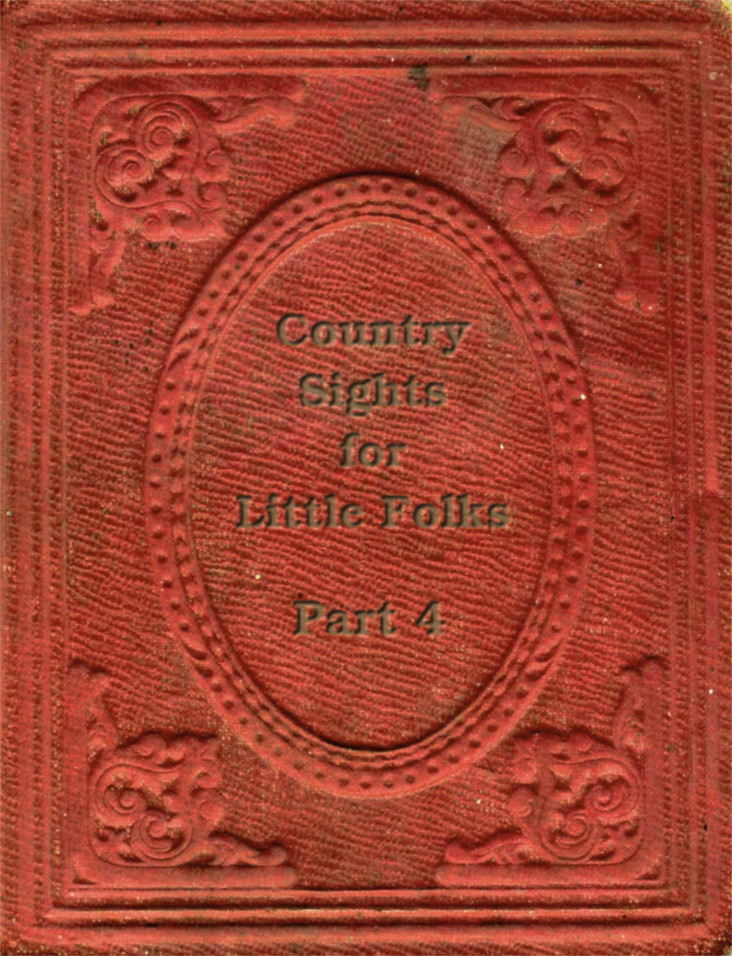REAPING
 As this work has generally to be performed in hot weather, it is very toilsome to the labourers. They work early and late; sometimes eighteen hours out of the twenty-four; for the two ends of the day are of course the coolest. It was formerly customary for the men to have an extra allowance of liquor in harvest time, but the temperance reformation has made it fashionable to drink only cold water, and this is much the best drink, for men as well as boys. Much more money is paid them for this than for common work. It is usual to cut wheat with an instrument called a sickle, which is bent round like the letter C, and has sharp teeth like a fine saw. It is also often cut with an instrument called a cradle. Do you know, when I was a little boy, I went into a harvest field while the men were at breakfast, and took up one of their sickles. The men called to me, and said I should cut my fingers, but I did not attend to them. So Away I went to the corn, and taking a great handful, I slashed away and cut more indeed than I intended; for I drew the sickle across all the fingers of my left hand, and nearly cut one of them off. Was not I rightly served for being so rude and meddlesome?
As this work has generally to be performed in hot weather, it is very toilsome to the labourers. They work early and late; sometimes eighteen hours out of the twenty-four; for the two ends of the day are of course the coolest. It was formerly customary for the men to have an extra allowance of liquor in harvest time, but the temperance reformation has made it fashionable to drink only cold water, and this is much the best drink, for men as well as boys. Much more money is paid them for this than for common work. It is usual to cut wheat with an instrument called a sickle, which is bent round like the letter C, and has sharp teeth like a fine saw. It is also often cut with an instrument called a cradle. Do you know, when I was a little boy, I went into a harvest field while the men were at breakfast, and took up one of their sickles. The men called to me, and said I should cut my fingers, but I did not attend to them. So Away I went to the corn, and taking a great handful, I slashed away and cut more indeed than I intended; for I drew the sickle across all the fingers of my left hand, and nearly cut one of them off. Was not I rightly served for being so rude and meddlesome?
THRESHING
 This work finds many a husbandman comfortable employment when the snow is on the ground, and he would otherwise have but little to do. There is an art in managing the flail, as they well know who take it in hand unwarily, and indeed it is quite prudent to stand out of the way of a young and confident beginner at this business—the flail usually strikes anything but the straw, and when it falls, usually jars the hand most sadly of the young operator. Wheat is now very often threshed out by an engine worked with horses, called a threshing-machine.
This work finds many a husbandman comfortable employment when the snow is on the ground, and he would otherwise have but little to do. There is an art in managing the flail, as they well know who take it in hand unwarily, and indeed it is quite prudent to stand out of the way of a young and confident beginner at this business—the flail usually strikes anything but the straw, and when it falls, usually jars the hand most sadly of the young operator. Wheat is now very often threshed out by an engine worked with horses, called a threshing-machine.
“Now thump away, master, but take care of me,
For I, little Susan, have just come to see:
0 dear, your stick’s broken, now, do not you know?
How can you thresh corn out with, that hanging so?”
“O no, little lady, the flail Is all right,
It is made in two pieces, and yet they hold tight;
I whisk’d it and twirl’d it the way that you saw,
To make it fall lengthwise at once on the straw.”
“But, good master Barney, (the little girl said,)
I am really afraid that you’ll hit your own head.”
“O no, little lady, give over your fears,
I do not hit heads, though I box many ears!”
< Part 3…..…..Index…..…..Part 5 >

